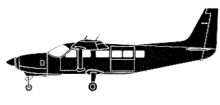Incident Overview

Description
A Cessna 208B Grand Caravan force landed short of the runway following a loss of engine power during a skydiving flight. The pilot was flying the last rotation of the day, when at approximately 3,800 m, the low fuel level warning light lit up red. The pilot asked the 18 skydivers to jump as quickly as possible. The passenger voluntarily remained on board. A minute later, once the drop was complete, the pilot began the descent. During this, the engine stopped. The pilot lengthened his trajectory so as not to interfere with the parachutists. He extended the flaps in landing configuration, but did not feather the propeller to avoid, according to him, a landing that took too long. On final, finding himself low on the glide path, he retracted the flaps hoping to reduce drag and thus be able to reach the runway. The aircraft lost lift and immediately sank, then touched down in a field before coming to rest in a ditch. Contributing factors: The following factors may have contributed to the forced landing short of the runway: – the decision to carry out the parachute-drop flight despite the low fuel level warning lights lighting up as soon as the engine was started, and the fuel quantities read on the gauges being less than the minimum quantity for carrying out this type of flight with this operator; – the lack of feathering of the propeller after engine shutdown, which resulted in additional drag and penalized the descent gradient; – the retraction of the flaps on final, resulting in a significant loss of lift.
Primary Cause
Insufficient fuel quantity and lack of propeller feathering during engine shutdown, leading to increased drag and reduced descent gradient.Insufficient fuel quantity and lack of propeller feathering during engine shutdown, leading to increased drag and reduced descent gradient.Share on:




